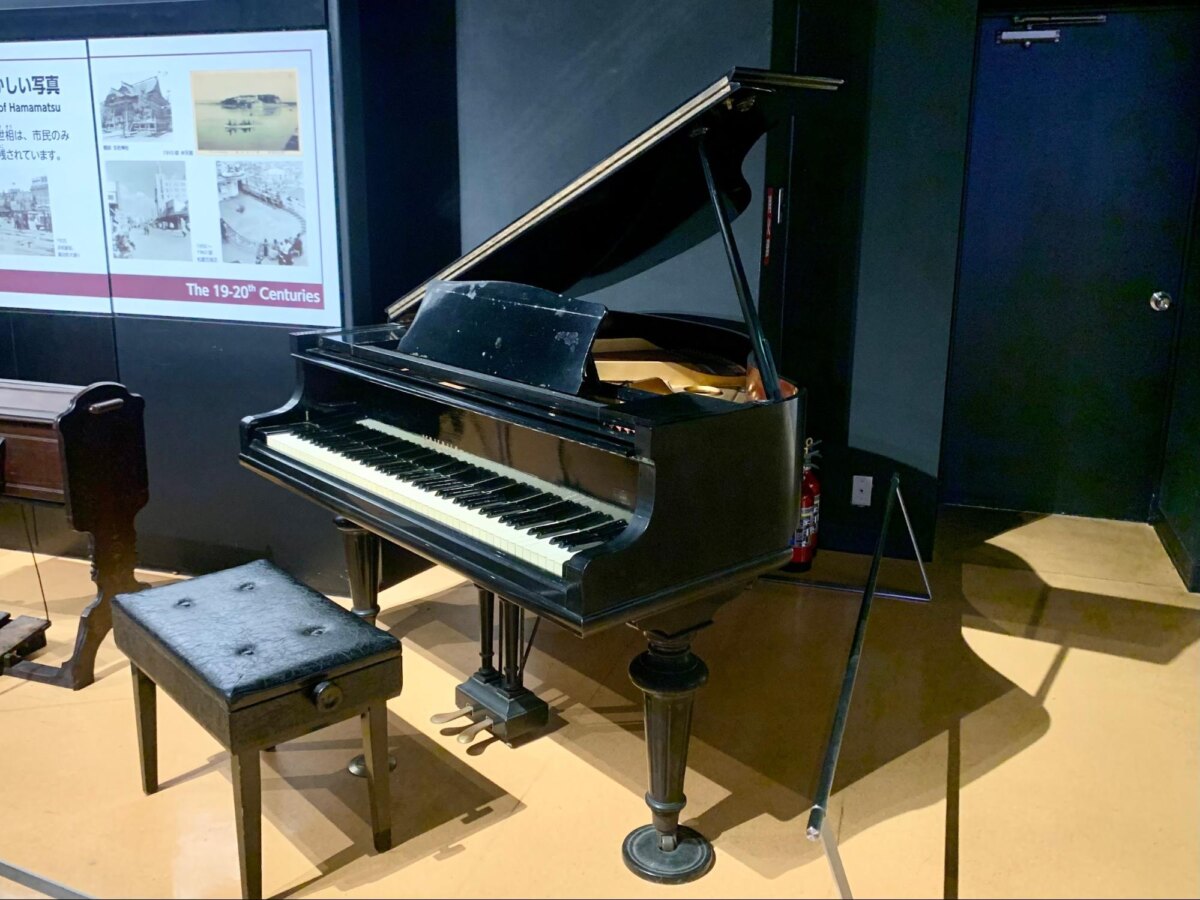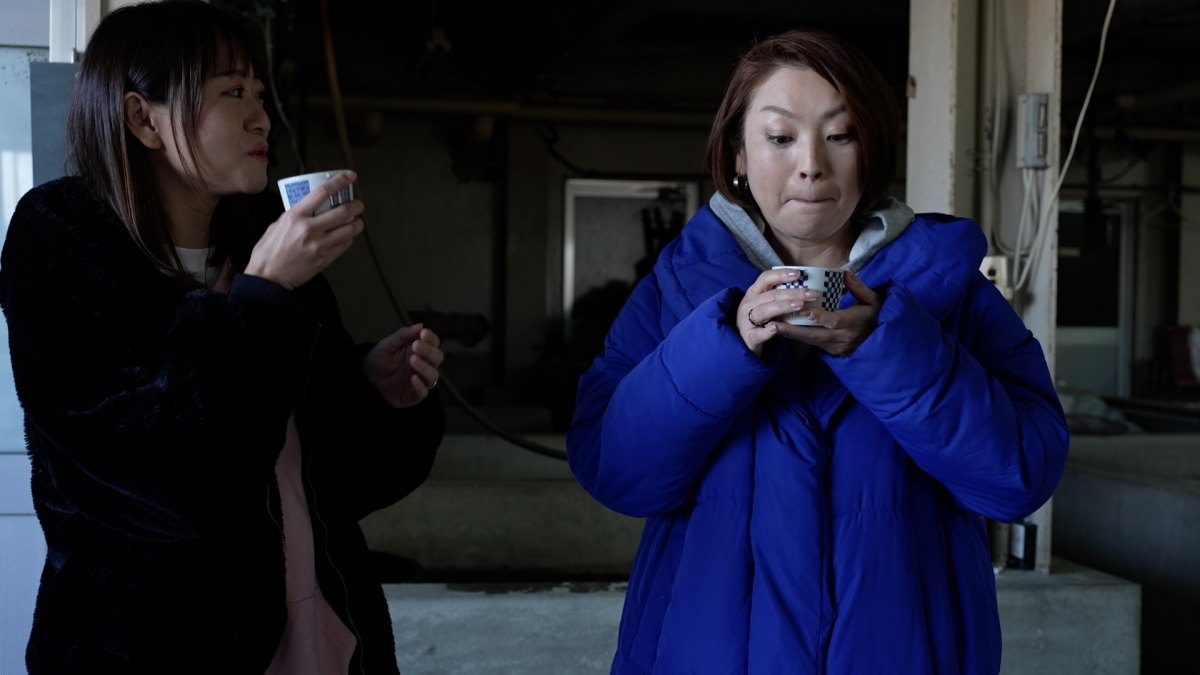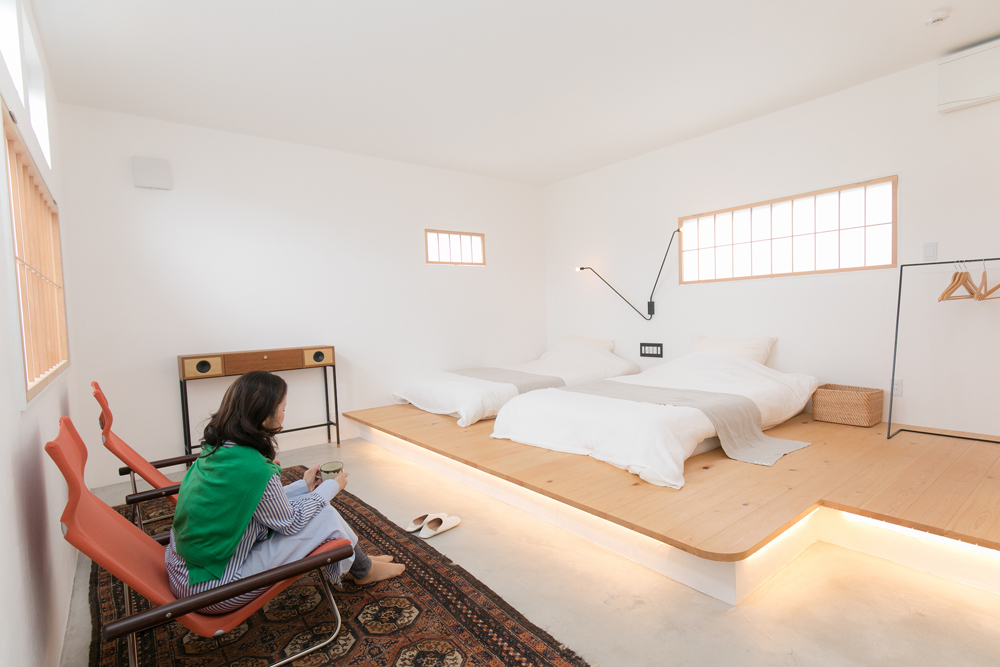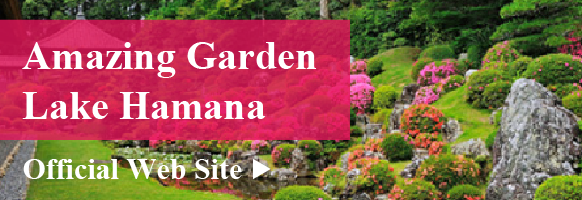Get to Know Hamamatsu

- Watch
The history of the musical instrument industry played by the Hamamatsu City Museum “Small Grand Piano”
The “*4-shaku piano” owned by the Hamamatsu City Museum is a small grand piano manufactured in the 1930s. Its small, cute appearance and beautiful tone make it a valuable asset that tells the history of Hamamatsu City’s musical instrument industry.
*”Shaku” is a unit that represents something unique to Japan.
1 shaku is approximately 30cm.
Even after nearly 90 years, this small grand piano has been preserved in its original state, and there are many hidden dramas behind it.
This time, we spoke to Hamamatsu City Museum’s director, Kazuyu Suzuki, and curator, Mitsuru Hashimoto, about the background to the birth of this small grand piano and the history of Hamamatsu’s musical instrument industry that can be seen in it.
"Small grand piano" left at Hamamatsu City Museum

(Left: Hamamatsu City Museum Director Suzuki, right: Curator Hashimoto)
The “4-shaku piano” is a small grand piano manufactured in the late 1930s.
This small grand piano, which is only 4 shaku (approximately 120 cm) deep, has been carefully preserved for a long time in the workshop of its designer, piano manufacturing engineer Ohashi Hataiwa.
It was donated to the Hamamatsu City Museum in 2012, and surprisingly, it is still in playable condition even though it has been around 90 years since it was manufactured.

Director Suzuki says, “The fact that the piano has remained in such good condition for such a long time is probably due to Mr. Ohashi’s careful management and maintenance in his workshop.”
Ohashi Hataiwa, the creator of the small grand piano
Mr. Ohashi Hataiwa, who designed this piano, is a piano manufacturing engineer from Iwata City, Shizuoka Prefecture.
At the age of 13, he joined Nippon Gakki Manufacturing Co., Ltd. (currently Yamaha Corporation) and became a disciple of Naoyoshi Yamaha, who is said to be the founder of piano technicians. Since then, he has been involved in piano design and manufacturing throughout his life.
The 1930s, when the small grand piano was born, was a time when the musical instrument industry was rapidly developing in Hamamatsu. In such an era, Mr. Ohashi set out to develop a small grand piano.
Background of the birth of the small grand piano
The 1930s was a time when popular culture was actively developing.
Hamamatsu was the center of the musical instrument industry, and various technological innovations were actively being carried out. One of them is the development of this small grand piano.
Although large grand pianos were ideal for concerts, they were not suitable for the average home. Therefore, there was a movement to develop a small grand piano as a product to enjoy music culture at home.
In response to these trends, Mr. Ohashi, a piano manufacturing engineer, went through much trial and error to design the 4-shaku piano, a small grand piano that was compact yet had a rich tone.
This small grand piano is also a symbol of technological innovation in the music industry at the time.

However, the period in which this piano was manufactured was short, and production ended with the beginning of World War II and the passage of time.
There are very few small grand pianos in existence, and only a few dozen are on display in Japan.
“If the trend of “developing a small home grand piano” had been delayed a few years, these unique products might not have been created,” says Director Suzuki.
The significance of the “small grand piano” that can only be conveyed through a museum
If you are visiting Hamamatsu City Museum for the first time, you may wonder, “Why is there a piano in the museum?”
Hamamatsu City Museum plays the role of conveying the history and culture of the region. The musical instrument industry is one of Hamamatsu’s important industries, and talking about its history is essential to understanding Hamamatsu’s identity.

“This small grand piano is of course rare as a musical instrument, but I believe it has a very important meaning in unraveling the history of Hamamatsu City’s industrial technology,” says Director Suzuki.
As Director Suzuki says, “Hamamatsu’s musical instrument industry has been built on the support and cooperation of local people.This piano is a symbol of that.”Even today, there are over 100 companies of all sizes in Hamamatsu. There are many musical instrument-related companies.
Many craftsmen and engineers are involved in the production of musical instruments, and the efforts of each of them come together to create a single instrument. In Hamamatsu, the city of music and Hamamatsu, the city of manufacturing, there are many small companies with unique technology for manufacturing musical instruments.
Many craftsmen and engineers are involved in the production of musical instruments, and the efforts of each of them come together to create a single instrument. In Hamamatsu, the city of music and Hamamatsu, the city of manufacturing, there are many small companies with unique technology for manufacturing musical instruments.
Why not take a look at the small grand piano at the Hamamatsu City Museum and think about the “character” of Hamamatsu?
“Small Grand Piano Fantastic Tones” to be held on Saturday, July 6, 2024
An event will be held where you can enjoy the sounds of the “small grand piano” at the Hamamatsu City Museum that we introduced this time!
At this event, you will enjoy a performance on a small grand piano by pianist Yukiko Moriyama, while learning about its historical background and rarity as an instrument.
Learn about the drama that lies in the background from various angles, centering on a single grand piano.
Would you like to experience this new way to enjoy a museum?
[Event details]
Date and time : Saturday, July 6, 2024 17:30-19:30 (venue 17:00)
Location : Hamamatsu City Museum (4-22-1 Namizuka, Chuo-ku, Hamamatsu City)
Fee: 1,500 yen
Capacity : 80 people (advance reservation required)
Performance : Yukiko Moriyama (Healing Sounds ~Mori and Izumi~)
MC : Junko Uchida (Freelance announcer/Former TV Shizuoka announcer)
Lecturer : Masayuki Tsuruta (Director, Hamamatsu City Musical Instrument Museum)
Kazuyu Suzuki (Director, Hamamatsu City Museum)
Mitsuru Hashimoto (Hamamatsu City Museum Curator)
Click here for reservations and applications
↓↓↓
This event has already ended. thank you.
If you want to know more about Hamamatsu's musical instrument industry, we also recommend this!
If you are interested in Hamamatsu’s musical instrument industry, we also recommend the following content.
The origins of Hamamatsu, the city of music – The early days of the local musical instrument industry and the biographies of the founders of eight member companies –
This is an electronic book provided by the Shizuoka Prefecture Musical Instrument Manufacturing Association. A detailed introduction to the early days of Hamamatsu’s musical instrument industry and the founders of the eight member companies.
Shizuoka Prefecture Musical Instrument Manufacturing Association Official YouTube Channel.
You can watch various videos about musical instrument manufacturing on the YouTube channel run by the Shizuoka Prefecture Musical Instrument Manufacturing Association.
address:〒432-8018
4-22-1 Shinzuka, Chuo-ku, Hamamatsu City
telephone number : 053-456-2208
Opening hours : 9am to 5pm
Closed days : Mondays (open if Monday is a holiday), the day after a holiday.Year-end and New Year holidays (December 29th to January 3rd)
There may be temporary closures, so please check the museum calendar for information on closing days.(Japanese link)
【https://www.city.hamamatsu.shizuoka.jp/hamahaku/index.html】
Admission fee:
Permanent exhibition (extra charge during special exhibition period)
Adults 310 yen / High school students 150 yen / Elementary and junior high school students free
Group discount available
⇒Details of admission fee(Japanese link)
【https://www.city.hamamatsu.shizuoka.jp/hamahaku/01sogo/ryokin.html】
Official website : Hamamatsu City Museum (Japanese link)
【https://www.city.hamamatsu.shizuoka.jp/hamahaku/index.html】











